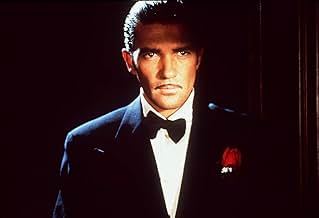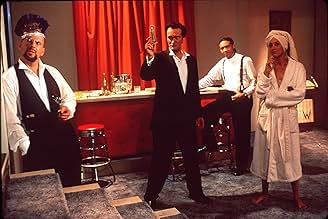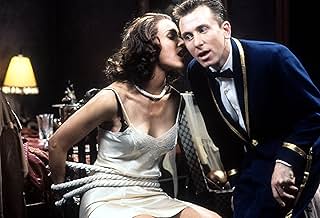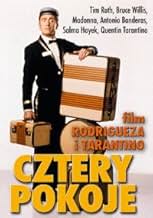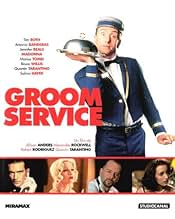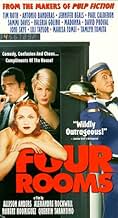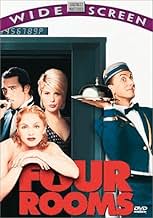Quatro histórias entrelaçadas que acontecem em um hotel que se desvanece na véspera do Ano Novo.Quatro histórias entrelaçadas que acontecem em um hotel que se desvanece na véspera do Ano Novo.Quatro histórias entrelaçadas que acontecem em um hotel que se desvanece na véspera do Ano Novo.
- Prêmios
- 1 vitória e 1 indicação no total
Amanda De Cadenet
- Diana (segment "The Missing Ingredient")
- (as Amanda deCadenet)
Patricia Vonne
- Corpse (segment "The Misbehavers")
- (as Patricia Vonne Rodriguez)
Avaliações em destaque
Four Rooms was concocted like one of those many, many collaborative efforts from directors in the 60's and 70's (i.e. The Witches, Ro.Go.PaG, Boccaccio '70, etc), except this would revolve around a bell-hop on New Years Eve. It disqualifies itself as being any kind of masterpiece or classic in independent film-making, and sometimes the filmmakers (Alison Anders, Robert Rodriguez, and Alexandre Rockwell, and Quentin Tarantino, the last two also serving as executive producer) look like they're relishing too much in their (limited) clout and exuberance to concentrate. As was with many others who viewed the film, I found that the first two segments were the lesser ones, and the last two were the best ones. It all comes down, in this case, to which two were funnier. So, let's break each one down:
Allison Anders' film is a quirky, quasi-lesbian take on a coven of witches, featuring the likes of Madonna and Lily Taylor, are the first to shake up (perhaps for the better in this one) Ted the bell-hop. Ted, by the way, is played with a continuous, nervous-type of fervor that goes from being innocuous, to annoying, and then acceptable again. It's also interesting to see how his character goes through different motions when under each director (for example, in Rodriguez's film he's more of a cartoon-type of character, and in Tarantino's film he hearkens slightly to his previous collaborations with the director, quieter, on edge in a particular way). Some of the laughs are surrounded by a kind of attitude put forth by the director that seems a little off. Maybe I'm the wrong audience for it, though- the women in the audience may appreciate it, or rather amused by it, more than I. I give it a B-
Alexandre Rockwell's The Wrong Man is my least favorite of the bunch, as Ted gets stuck with a couple of crazed fetishists (David Proval and Jennifer Beals). The problem here lies with two things- the fact that the comedic timing/chemistry is a little iffy/off with the three actors, and that the writing doesn't come off like it's naturally funny. When Beals' character Angela runs off about Ted's private parts, this could be funny, but it's more 'ho-ho' than 'ha-ha' to me. Some of the tension from Roth brings some laughs, but not enough to compensate the uncomfortable atmosphere around the whole segment. I give it a C-
The third segment, The Misbehaviors, displays how clever and quick Rodriguez can be with physical comedy (slapstick) as well as in getting laughs from kids (as he did here and there in his Spy Kids movies). It is also a boost that the whole segment comes off as though it's like a live-action Looney Tunes short- it's so ridiculous that in some scenes I burst out laughing (i.e. Ted's reaction to the corpse). The set-up with the parents was also amusing in how Banderas and Tamlyn Tomita act towards the kids. Then the pay-off knocks it out of the park. Grade: A
Then we come to the closure, featuring the indie wunderkind at the time, Tarantino, as he takes on two sources of inspiration- Rohald Dahl's "Man from the South" short story, later translated through Alfred Hitchcock's television show. It's a smart, hip little piece of Hollywood satire from Tarantino, as he himself plays an overly obnoxious Hollywood filmmaker, with two guys by his side (Paul Calderon and Bruce Willis), as they take a gamble right after the stroke of midnight. It took me a couple of time to watch this to really get into it, but when I did it was even more promising. The camera-work in the scene (via 'Dogs' and 'Pulp' cinematographer Andrzej Sekula) is deliberately paced, and it's perfectly leisurely for the pace of the last segment. That much, if not all, of the dialog is funny it's because of the skill and chemistry between the four of them. Plus, a little prologue with Marisa Tomei and Kathy Griffin gives the indication of what insanity is in store. Grade- A.
So, is this film a success? For it's time, I'm not sure. With the power of four million off the success of each director's previous efforts (Tarantino with 'Dogs', Rodriguez with El Mariachi, Anders with Gas, Food, and Lodging, and Rockwell with In the Soup, all from the 92 Sundance place), they did whatever they wanted, and it's not the success it could've been. On the other hand, when one looks at the films in perspective, it could've been a lot worse, and it wasn't. At the least, it works as one of the quintessential party movies for fans of the 90's "new-wave" crop.
Allison Anders' film is a quirky, quasi-lesbian take on a coven of witches, featuring the likes of Madonna and Lily Taylor, are the first to shake up (perhaps for the better in this one) Ted the bell-hop. Ted, by the way, is played with a continuous, nervous-type of fervor that goes from being innocuous, to annoying, and then acceptable again. It's also interesting to see how his character goes through different motions when under each director (for example, in Rodriguez's film he's more of a cartoon-type of character, and in Tarantino's film he hearkens slightly to his previous collaborations with the director, quieter, on edge in a particular way). Some of the laughs are surrounded by a kind of attitude put forth by the director that seems a little off. Maybe I'm the wrong audience for it, though- the women in the audience may appreciate it, or rather amused by it, more than I. I give it a B-
Alexandre Rockwell's The Wrong Man is my least favorite of the bunch, as Ted gets stuck with a couple of crazed fetishists (David Proval and Jennifer Beals). The problem here lies with two things- the fact that the comedic timing/chemistry is a little iffy/off with the three actors, and that the writing doesn't come off like it's naturally funny. When Beals' character Angela runs off about Ted's private parts, this could be funny, but it's more 'ho-ho' than 'ha-ha' to me. Some of the tension from Roth brings some laughs, but not enough to compensate the uncomfortable atmosphere around the whole segment. I give it a C-
The third segment, The Misbehaviors, displays how clever and quick Rodriguez can be with physical comedy (slapstick) as well as in getting laughs from kids (as he did here and there in his Spy Kids movies). It is also a boost that the whole segment comes off as though it's like a live-action Looney Tunes short- it's so ridiculous that in some scenes I burst out laughing (i.e. Ted's reaction to the corpse). The set-up with the parents was also amusing in how Banderas and Tamlyn Tomita act towards the kids. Then the pay-off knocks it out of the park. Grade: A
Then we come to the closure, featuring the indie wunderkind at the time, Tarantino, as he takes on two sources of inspiration- Rohald Dahl's "Man from the South" short story, later translated through Alfred Hitchcock's television show. It's a smart, hip little piece of Hollywood satire from Tarantino, as he himself plays an overly obnoxious Hollywood filmmaker, with two guys by his side (Paul Calderon and Bruce Willis), as they take a gamble right after the stroke of midnight. It took me a couple of time to watch this to really get into it, but when I did it was even more promising. The camera-work in the scene (via 'Dogs' and 'Pulp' cinematographer Andrzej Sekula) is deliberately paced, and it's perfectly leisurely for the pace of the last segment. That much, if not all, of the dialog is funny it's because of the skill and chemistry between the four of them. Plus, a little prologue with Marisa Tomei and Kathy Griffin gives the indication of what insanity is in store. Grade- A.
So, is this film a success? For it's time, I'm not sure. With the power of four million off the success of each director's previous efforts (Tarantino with 'Dogs', Rodriguez with El Mariachi, Anders with Gas, Food, and Lodging, and Rockwell with In the Soup, all from the 92 Sundance place), they did whatever they wanted, and it's not the success it could've been. On the other hand, when one looks at the films in perspective, it could've been a lot worse, and it wasn't. At the least, it works as one of the quintessential party movies for fans of the 90's "new-wave" crop.
"Four Rooms" is far more entertaining than you would expect from its generally negative reviews. Which is not to say that any of it is a masterpiece but if you enjoyed "Love American Style" on television and are not put off by a raunchy take on that anthology concept you should make an effort to view this film. Each story is taking place in a different room of a hotel the same night. It was made between the time Tarantino made "Pulp Fiction" and worked on "Dusk Till Dawn" with Rodriquez. Many in the large cast are Tarantino and Rodriquez regulars. Here are a few of the reasons to watch each of the four stories:
"The Missing Ingredient" - Madona has simply never looked better and her "come get me" dress will burn your eyeballs. Alicia Witt plays her stock alienated teen and delivers sarcasm as only she can.
"The Wrong Man" – Alexander Rockwell directed this segment shortly after directing "In the Soup" so he already knew how to get the most out of Jennifer Beals. Her diatribe about Ted's sex organ is a cinema classic.
"The Misbehavers" – Rodriquez directs his favorite actor Antonio Banderas in something that is a throwback to classic Laurel and Hardy. Not only do his two kids misbehave when left alone in their hotel room, but their misbehavior is so comprehensive that the closing shot reveals a room of total anarchy. It is wonderful slapstick on a huge scale, with comic timing worthy of the Laural and Hardy and the Marx Brothers.
"The Man From Hollywood" – This has the best script with Tarantino reserving the best stuff for his own character. He even reprises the "tasty beverage" line from "Pulp Fiction. Beals has already found her way to this room by the time bellboy Roth arrives and she delivers more good lines. I was impressed that Tarantino built up his suspense "before" the contest began and then did not try to extend the suspense but ended things on the first attempt.
The best bit in the whole film might be Roth's phone call to his boss. Marisa Tomei answers the phone in a room full of comatose post-New Years Eve partygoers. She then does a version of her "My Cousin Vinnie" expert witness routine, this time concerning types of handguns. In the foreground the entire time are the only other conscious (but totally stoned) inhabitants of the room. They are playing against each other in a video game. One just stares in stunned fascination at the screen, holding the controller but not using it as the other player maniacally manipulates his controller throughout the entire phone conversation.
"The Missing Ingredient" - Madona has simply never looked better and her "come get me" dress will burn your eyeballs. Alicia Witt plays her stock alienated teen and delivers sarcasm as only she can.
"The Wrong Man" – Alexander Rockwell directed this segment shortly after directing "In the Soup" so he already knew how to get the most out of Jennifer Beals. Her diatribe about Ted's sex organ is a cinema classic.
"The Misbehavers" – Rodriquez directs his favorite actor Antonio Banderas in something that is a throwback to classic Laurel and Hardy. Not only do his two kids misbehave when left alone in their hotel room, but their misbehavior is so comprehensive that the closing shot reveals a room of total anarchy. It is wonderful slapstick on a huge scale, with comic timing worthy of the Laural and Hardy and the Marx Brothers.
"The Man From Hollywood" – This has the best script with Tarantino reserving the best stuff for his own character. He even reprises the "tasty beverage" line from "Pulp Fiction. Beals has already found her way to this room by the time bellboy Roth arrives and she delivers more good lines. I was impressed that Tarantino built up his suspense "before" the contest began and then did not try to extend the suspense but ended things on the first attempt.
The best bit in the whole film might be Roth's phone call to his boss. Marisa Tomei answers the phone in a room full of comatose post-New Years Eve partygoers. She then does a version of her "My Cousin Vinnie" expert witness routine, this time concerning types of handguns. In the foreground the entire time are the only other conscious (but totally stoned) inhabitants of the room. They are playing against each other in a video game. One just stares in stunned fascination at the screen, holding the controller but not using it as the other player maniacally manipulates his controller throughout the entire phone conversation.
I seem to recall that when "Four Rooms" came out, it was critically and commercially derided. When I saw it a few months later, I actually thought that it was pretty well done. I knew that Quentin Tarantino was involved in the making, so I could safely assume that there was an element of sleaze in the movie.
Well, the movie is likely to blow anyone away, just in terms of how far they go. Portraying bellhop Ted (Tim Roth) and his loony experiences on New Year's Eve while waiting on several people in a hotel, they blow everything out of the water. The first two segments are pretty lowbrow: the first one portrays a witches' coven and the second one portrays a psychopath who thinks that Ted had sex with his wife.
But when we get to the third segment, that's where the movie really takes off. Ted has to watch the children of a slick Mexican guy named Man (Antonio Banderas). After a few incidents, Man comes back and finds the room in the most mind-blowing scene imaginable. And, the last segment. Ted, in a totally frenetic state, goes to a room where several Hollywood guys are having a discussion (with as many curse words as possible). What happens at the end of that segment...well, let me just tell you that no one sees that coming! All in all, people who think that the movie didn't go anywhere obviously missed the point. I don't know for certain whether this movie was just an excuse to be crazy, but it sure seemed like that. You're sure to have fun watching it. Also starring Madonna, Valeria Golino, Jennifer Beals, Salma Hayek, and even Quentin Tarantino in the final segment playing a Hollywood type.
Well, the movie is likely to blow anyone away, just in terms of how far they go. Portraying bellhop Ted (Tim Roth) and his loony experiences on New Year's Eve while waiting on several people in a hotel, they blow everything out of the water. The first two segments are pretty lowbrow: the first one portrays a witches' coven and the second one portrays a psychopath who thinks that Ted had sex with his wife.
But when we get to the third segment, that's where the movie really takes off. Ted has to watch the children of a slick Mexican guy named Man (Antonio Banderas). After a few incidents, Man comes back and finds the room in the most mind-blowing scene imaginable. And, the last segment. Ted, in a totally frenetic state, goes to a room where several Hollywood guys are having a discussion (with as many curse words as possible). What happens at the end of that segment...well, let me just tell you that no one sees that coming! All in all, people who think that the movie didn't go anywhere obviously missed the point. I don't know for certain whether this movie was just an excuse to be crazy, but it sure seemed like that. You're sure to have fun watching it. Also starring Madonna, Valeria Golino, Jennifer Beals, Salma Hayek, and even Quentin Tarantino in the final segment playing a Hollywood type.
It's a pity that the critics gave 'Four Rooms' as hard a time as they did back in 1995, because, for everything that can be said to be wrong with it, it really does sparkle with creativity and a desire to stand out from the rest of the crowd. And let's face it, there was enough popular talent involved, including Alison Anders, Alexandre Rockwell, Robert Rodriguez and, last but not least, Quentin Tarantino, for it to have been hailed as an instant cult classic. Instead, it was bashed into submission and retreated very quickly to the back of nearly everyone's resume. With retrospect most of this reproach was probably ill-deserved - 'Four Rooms' does have its blatant moments of weakness, but then again so do a lot of the more half-baked cookie-cutter comedies which have somehow garnered more admiration than this. On the whole it's a very unusual and interesting combination - an offbeat, frisky and strangely feel-good comedy with some sinister undertones and lots of weird, intricate little details. Consisting of four 20-minute segments, each assembled by a different director's hands, it takes us through the various happenings inside separate rooms of the same hotel on New Year's Eve, as experienced by Ted, the only bellhop still left standing for the night shift. There is the slight feeling of inconsistency in moving from one directing style to the next, and a couple of attempts to interconnect the segments are a little self-contradictory. Some of it works and some it doesn't, but the end result is an episodic anthology that, if nothing too spectacular, still proves itself to be very likable in the long run.
'The Missing Ingredient' and 'the Wrong Man' are often credited with constituting the weaker half of the film, and I can't really say I disagree. 'The Missing Ingredient' tries hard to be risqué, but falls pretty short - for a story concerning a coven of bare-breasted witches trying to extract an unwilling man's semen for use in a ritual, it's remarkably innocuous and fluffy, and the visual effects only add a layer of tackiness to boot. 'The Wrong Man' is a tad more snappy and sports some stylish direction (the shot where Sigfried grabs the ringing telephone is right-on), but is ultimately swallowed up in its frenzied editing. We can vaguely understand what's happening in this segment (if not, then Ted does drop a pretty big hint later on in the film), but it makes itself unnecessarily incoherent, with bizarre imagery that adds nothing but extra confusion (the baby flashback, anyone?). It's almost as though Alexandre Rockwell isn't sure whether he wants us to be in on the whole set-up with Sigfried and Angela, or confused and in the dark like Ted, and in the end tries to accommodate both perspectives, which doesn't really wash.
It's once we reach the second half that the true quality really starts to seep its way in, and the film suddenly becomes very rewarding. 'The Misbehaviours' is a spirited little contribution that combines a moderate dose of macabre darkness with its cartoon-like innocence. Antonio Banderas certainly hits a good spot as the no-nonsense father who appoints Ted to keep an eye on his two young children while he's out, whilst the children themselves are rebellious but not irritating, all making for a surprisingly sharp and sophisticated slice of knockabout. 'The Man from Hollywood', meanwhile, is equally brilliant - Tarantino's vibrant, well-scripted take on Roald Dahl's chilling short story, 'the Man from the South', which pits Ted in the same room as cocky Hollywood director Chester Rush (and it's always a treat to see Quentin himself tackle such a winking, self-depreciating role). It manages to be tense and enjoyable, with the usual smart direction that any Tarantino fan should be able to appreciate. Overall, there's enough vitality in these particular segments to just about redeem the shakiness of the first half.
Besides, we have Tim Roth playing our hapless protagonist throughout, and, yes, that is a lot. He proves himself to be very capable in a comic performance, bringing enough gentle magnetism to his character Ted the bellhop, through his good intentions, perseverance and various neurotic mannerisms, to get us genuinely attached to him. It is hard not to come away with the impression that all four directors had a slightly different take on Ted's disposition - he goes from being timid and impressionable to obtuse and jumpy, then highly-strung and a little devious, and finally composed and relatively rational - but Roth does well in single-handedly bridging these gaps and, with the many mishaps his character has to endure over the course of the night, ensures that all changes in temper seem understandable. He retains his good-natured lovability for the entire running time, and, for anyone who can really relate to poor Ted (like yours truly), he'll have you rooting for him to the very satisfying end.
To my knowledge, there was never any other film quite like 'Four Rooms' and, judging by just how unwelcome this one was made to feel when it arrived, there probably won't be another for quite some time. It remains an ambitious and not entirely successful little sleeper, but has a good deal going for it nonetheless, and I urge all fans of Tarantino, Rodriguez and Roth in particular not to be put off by the bad press and to give it a chance. Who knows? One day, it might just make a fresh start and find the cult audience that appreciates it yet.
'The Missing Ingredient' and 'the Wrong Man' are often credited with constituting the weaker half of the film, and I can't really say I disagree. 'The Missing Ingredient' tries hard to be risqué, but falls pretty short - for a story concerning a coven of bare-breasted witches trying to extract an unwilling man's semen for use in a ritual, it's remarkably innocuous and fluffy, and the visual effects only add a layer of tackiness to boot. 'The Wrong Man' is a tad more snappy and sports some stylish direction (the shot where Sigfried grabs the ringing telephone is right-on), but is ultimately swallowed up in its frenzied editing. We can vaguely understand what's happening in this segment (if not, then Ted does drop a pretty big hint later on in the film), but it makes itself unnecessarily incoherent, with bizarre imagery that adds nothing but extra confusion (the baby flashback, anyone?). It's almost as though Alexandre Rockwell isn't sure whether he wants us to be in on the whole set-up with Sigfried and Angela, or confused and in the dark like Ted, and in the end tries to accommodate both perspectives, which doesn't really wash.
It's once we reach the second half that the true quality really starts to seep its way in, and the film suddenly becomes very rewarding. 'The Misbehaviours' is a spirited little contribution that combines a moderate dose of macabre darkness with its cartoon-like innocence. Antonio Banderas certainly hits a good spot as the no-nonsense father who appoints Ted to keep an eye on his two young children while he's out, whilst the children themselves are rebellious but not irritating, all making for a surprisingly sharp and sophisticated slice of knockabout. 'The Man from Hollywood', meanwhile, is equally brilliant - Tarantino's vibrant, well-scripted take on Roald Dahl's chilling short story, 'the Man from the South', which pits Ted in the same room as cocky Hollywood director Chester Rush (and it's always a treat to see Quentin himself tackle such a winking, self-depreciating role). It manages to be tense and enjoyable, with the usual smart direction that any Tarantino fan should be able to appreciate. Overall, there's enough vitality in these particular segments to just about redeem the shakiness of the first half.
Besides, we have Tim Roth playing our hapless protagonist throughout, and, yes, that is a lot. He proves himself to be very capable in a comic performance, bringing enough gentle magnetism to his character Ted the bellhop, through his good intentions, perseverance and various neurotic mannerisms, to get us genuinely attached to him. It is hard not to come away with the impression that all four directors had a slightly different take on Ted's disposition - he goes from being timid and impressionable to obtuse and jumpy, then highly-strung and a little devious, and finally composed and relatively rational - but Roth does well in single-handedly bridging these gaps and, with the many mishaps his character has to endure over the course of the night, ensures that all changes in temper seem understandable. He retains his good-natured lovability for the entire running time, and, for anyone who can really relate to poor Ted (like yours truly), he'll have you rooting for him to the very satisfying end.
To my knowledge, there was never any other film quite like 'Four Rooms' and, judging by just how unwelcome this one was made to feel when it arrived, there probably won't be another for quite some time. It remains an ambitious and not entirely successful little sleeper, but has a good deal going for it nonetheless, and I urge all fans of Tarantino, Rodriguez and Roth in particular not to be put off by the bad press and to give it a chance. Who knows? One day, it might just make a fresh start and find the cult audience that appreciates it yet.
I've decided to review each segment separately, this may take a while so if you can't be bothered please feel free to move on, but I'm trying to save you time and money.
Segment#1: The Missing Ingredient
Aka this biggest piece of sh*t I've ever had the (dis)pleasure of viewing. If you want to see how not to make a short story then watch this segment, it's badly timed, badly judged, badly acted - just plain bad. I gave up watching the film on the first attempt because this was just awful, why the hell did they cast Madonna, avoid at all costs. (1/10)
Segment#2: The Wrong Man
Things don't get much better in Rockwell's piece, the cinematography and production design are nice but besides that the entire thing is just dull, the plot is just too deeply structured to work on this small running time. More threatening than comedic; let's move on. (3/10)
Segment#3: The Misbehavers
Believe what others have written, this IS the reason to watch this movie, brilliant non-stop hilarity as Tim Roth's Ted the Bellboy is left in charge of two brat-ish troublesome kids. Rodriguez has a great handle on the mixture of slapstick farce and black comedy that's very satisfying. Things can only get better... (9/10)
Segment#4: The Man From Hollywood ...Except they don't. Tarantino's segment is good enough, lots of experiments with primary colours and long stedicam tracking shots, but you can't help thinking the film is just pandering to Tarantino's ego (he play's the biggest star in Hollywood). But the ending works well and the tension built is fantastic. (8/10)
To finish, Four Rooms would have been better if they had scraped the first two monstrosities (Anders and Rockwell where riding the coattails of Rodriguez and Tarantino anyway and have no where near as much talent) and kept the film as an hour-long TV special. If you must watch it, fast forward the first two segments, you'll save a lot of time and effort...
Overall rating 4/10
Segment#1: The Missing Ingredient
Aka this biggest piece of sh*t I've ever had the (dis)pleasure of viewing. If you want to see how not to make a short story then watch this segment, it's badly timed, badly judged, badly acted - just plain bad. I gave up watching the film on the first attempt because this was just awful, why the hell did they cast Madonna, avoid at all costs. (1/10)
Segment#2: The Wrong Man
Things don't get much better in Rockwell's piece, the cinematography and production design are nice but besides that the entire thing is just dull, the plot is just too deeply structured to work on this small running time. More threatening than comedic; let's move on. (3/10)
Segment#3: The Misbehavers
Believe what others have written, this IS the reason to watch this movie, brilliant non-stop hilarity as Tim Roth's Ted the Bellboy is left in charge of two brat-ish troublesome kids. Rodriguez has a great handle on the mixture of slapstick farce and black comedy that's very satisfying. Things can only get better... (9/10)
Segment#4: The Man From Hollywood ...Except they don't. Tarantino's segment is good enough, lots of experiments with primary colours and long stedicam tracking shots, but you can't help thinking the film is just pandering to Tarantino's ego (he play's the biggest star in Hollywood). But the ending works well and the tension built is fantastic. (8/10)
To finish, Four Rooms would have been better if they had scraped the first two monstrosities (Anders and Rockwell where riding the coattails of Rodriguez and Tarantino anyway and have no where near as much talent) and kept the film as an hour-long TV special. If you must watch it, fast forward the first two segments, you'll save a lot of time and effort...
Overall rating 4/10
Você sabia?
- CuriosidadesThe reason Bruce Willis is not credited is because he violated SAG rules for acting in this film for no money. He appeared for fun and as a favor to Quentin Tarantino, and acting for free violated SAG rules. SAG agreed not to sue Willis if his name was not included in the credits.
- Erros de gravaçãoWhen Ted leaves the room with the married couple, his hair is visibly shorter than when he was in the room.
- Citações
Angela: Whether you like it or not, you are in the middle of a situation here you cannot just wish your way out of.
Ted the Bellhop: But I've never met you people before! You're complete strangers!
Angela: Everybody starts out as strangers, Ted. It's where we end up that counts.
- Cenas durante ou pós-créditosBruce Willis does not apear in the credits but his hairstylist does
- Versões alternativasAs indicated in the Technical Specifications link for this page on IMDB, there are two different versions of this film: "1 hr 38 min (98 min)" and "1 hr 50 min (110 min) (workprint)". Information on the workprint is as follows: "[The] second version is in English but it is overdubbed with Russian. This makes it almost impossible to work out what is extra as the Russian is much louder than the English and therefore the English cannot be heard for the majority of the movie. I have done some research and have been told that it is impossible to remove the Russian audio. The disc also contains a deleted scene from the Spanish DVD that is an alternate take, not used in either the DVD Version or the Workprint."
- ConexõesFeatured in Cinemania: Ypalliloi en drasei! (2009)
- Trilhas sonorasSentimental Journey
Written by Bud Green, Les Brown, Ben Homer
Performed by Juan García Esquivel (as Esquivel)
Courtesy of The RCA Records label of BMG Music
Principais escolhas
Faça login para avaliar e ver a lista de recomendações personalizadas
- How long is Four Rooms?Fornecido pela Alexa
Detalhes
- Data de lançamento
- País de origem
- Central de atendimento oficial
- Idioma
- Também conhecido como
- Grande Hotel: Uma Comédia 5 Estrelas
- Locações de filme
- Empresas de produção
- Consulte mais créditos da empresa na IMDbPro
Bilheteria
- Orçamento
- US$ 4.000.000 (estimativa)
- Faturamento bruto nos EUA e Canadá
- US$ 4.257.354
- Fim de semana de estreia nos EUA e Canadá
- US$ 427.733
- 25 de dez. de 1995
- Faturamento bruto mundial
- US$ 4.257.354
- Tempo de duração1 hora 38 minutos
- Cor
- Mixagem de som
- Proporção
- 1.85 : 1
Contribua para esta página
Sugerir uma alteração ou adicionar conteúdo ausente




